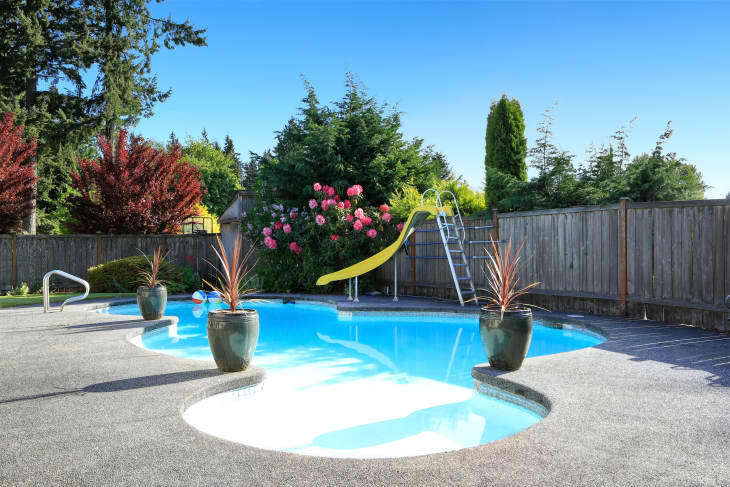5 Things You Might Not Know About Buying a House with a Pool

The idea of owning a home with a pool can be enticing to many homebuyers. Who doesn’t love the idea of cooling off with a swim after spending the day tackling yard work or simply floating around and enjoying a lazy Sunday? While there are plenty of benefits to purchasing a house that has its own oasis, there are a few things that you should consider before diving in.
You’ll have higher utility bills and maintenance costs.
You may already know that your utilities are likely to go up when your backyard boasts a swimming hole, but Jake Arden, a broker associate with the Arden Group at John R. Wood Properties says you’re definitely going to feel a pinch when it comes to your electric bill and having to buy chemicals like chlorine. “When buying a house with a pool you can expect to pay a higher electricity bill to run the pool pump and heater,” he says. In areas with shorter summers (or for homeowners who like their pool water to feel more like bath water) that heating bill could really spike.
To sidestep some of these costs, Arden suggests asking your real estate agent to find out if the pool has a heater or a solar heater installed. “A solar heater attaches to the roof of your home and heats your pool by circulating the water onto your roof and back into your pool, this in return will help save on your monthly electric bills.”
You’ll need to get the right insurance policy.
You’ll need to take special consideration when getting insurance for your home if the property has a pool, which is why Arden says you should shop around for multiple homeowners insurance quotes to make sure you’re getting the best price. Homeowners insurance policies for pool owners may require higher liability coverages and special endorsements.
Plan for a bigger mortgage payment.
Homes with pools commonly sell at a premium over homes without pools, which means you may need to borrow more to buy one. That being said, there are perks of owning a pool if and when you decide it’s time to move. “You will pay more monthly for a pool home, but when it comes to selling, yours will stand out among the competition without pools,” Arden says.
Decide if it’s worth it to you.
Arden says every time one of his clients considers a home with pools he always asks them how important it is to them. “Owning a pool means more maintenance with monthly expenses, water being dragged through the house on floors (when using the restroom, if, in fact, people don’t use the pool as a restroom), and there is always more liability with pets, children, friends, etc.,” he says, adding that finding a home in a community with a public pool may be a better option for some.
Ask questions and get an inspection.
There are a couple of key points Arden says you should talk to your real estate agent about if you’re seriously considering taking the plunge. “The main question a buyer should ask their Realtor is if the pool is concrete, fiberglass, or exactly what material it’s made out of,” he says. “This is important to the longevity of the pool and of course the resale value.”
Additionally, you’ll always want to try to determine the age of the pool and pool equipment. “The final takeaway item when buying a pool home is to make sure you have a great inspector to fully inspect the pool and equipment,” he adds.
A pool can really help to turn a house into a dream home, but if it ends up being more than you bargained for, it can quickly turn into a nightmare.